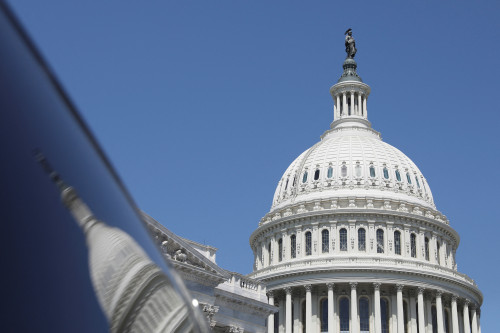By David Morgan
WASHINGTON (Reuters) -President Donald Trump’s sweeping tax-cut and spending bill would lead to a larger-than-expected $2.8 trillion increase in the federal deficit over the decade, despite a boost to U.S. economic output, the nonpartisan Congressional Budget Office projected on Tuesday.
The budget watchdog’s dynamic analysis of the legislation, which passed the House of Representatives in May, appeared to contradict long-held Republican claims that the bill’s tax-cut regime would reduce federal deficits over the next decade by accelerating economic growth and generating new tax revenue from heightened business activity.
CBO released the report as Senate Republicans debated a revised version of the measure’s tax provisions, which independent analysts have predicted would cost the Treasury even more, by making permanent business tax provisions that would sunset under the House bill.
“We believe it leads to a stronger and more prosperous America,” said Senate Majority Leader John Thune, who hopes to pass an amended version of the bill out of his chamber next week.
The House legislation’s tax provisions would boost real gross domestic product by an average 0.5% over the next decade, leading to an $85 billion reduction in the U.S. deficit, according to the CBO. But the bill would also lead to higher interest rates, boosting interest payments on the federal debt by $441 billion, the agency said.
Two weeks ago, the CBO projected that Trump’s One Big Beautiful Bill Act would add another $2.4 trillion to the federal government’s $36.2 trillion debt over a decade, without considering the potential economic effects. With interest payments from the new debt included, the cost would rise to $3 trillion.
In its latest analysis, CBO estimates the bill would increase the deficit by a total of $3.4 trillion over the decade, when the cost of rising interest payments due to increased borrowing needs are included.
Independent analysts have projected that the debt increase could reach $5 trillion over a decade under the Senate version, due to permanent business tax breaks.
The different House and Senate versions of the bill in the narrowly Republican-controlled Congress could complicate party leaders’ goal of passing the bill, which is the centerpiece of Trump’s domestic agenda, before a self-imposed July 4 deadline.
The Senate changes have run into early resistance from two separate Republican camps: those who want deeper spending cuts to attack the growing federal deficit and others looking to preserve social-safety nets including the Medicaid healthcare program for lower-income Americans.
(Reporting by David Morgan; Editing by Scott Malone, Leslie Adler and Bill Berkrot)


